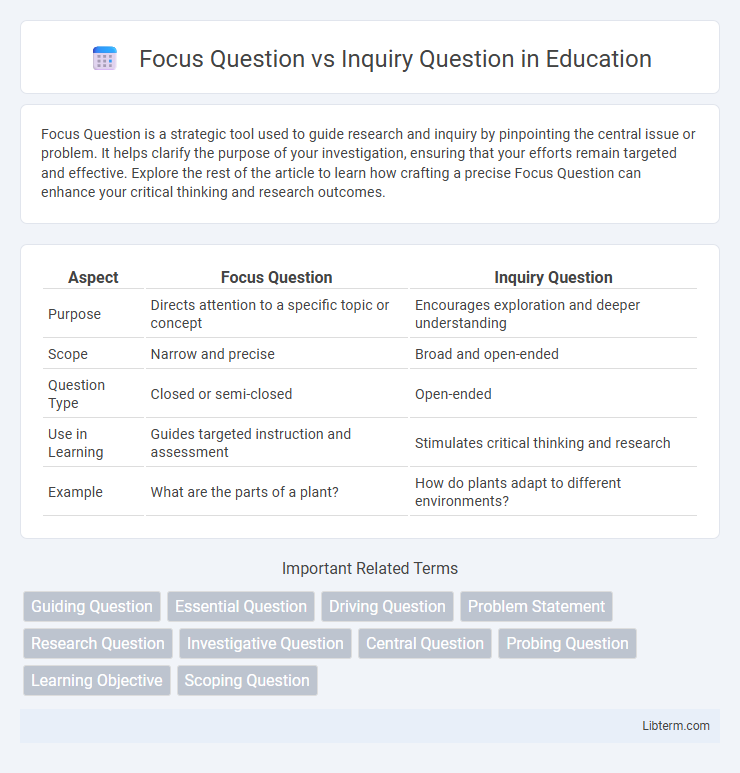Focus Question is a strategic tool used to guide research and inquiry by pinpointing the central issue or problem. It helps clarify the purpose of your investigation, ensuring that your efforts remain targeted and effective. Explore the rest of the article to learn how crafting a precise Focus Question can enhance your critical thinking and research outcomes.
Table of Comparison
| Aspect | Focus Question | Inquiry Question |
|---|---|---|
| Purpose | Directs attention to a specific topic or concept | Encourages exploration and deeper understanding |
| Scope | Narrow and precise | Broad and open-ended |
| Question Type | Closed or semi-closed | Open-ended |
| Use in Learning | Guides targeted instruction and assessment | Stimulates critical thinking and research |
| Example | What are the parts of a plant? | How do plants adapt to different environments? |
Understanding Focus Questions: Definition and Purpose
Focus questions are precise, targeted queries designed to guide research or discussion by narrowing the scope to specific aspects of a topic. Their purpose is to direct attention toward core concepts, ensuring clarity and depth in understanding, often framing the main objective of a study or lesson. Unlike broader inquiry questions, focus questions facilitate concentrated analysis and foster critical engagement with key issues.
Inquiry Questions Explained: Meaning and Significance
Inquiry questions are open-ended prompts designed to stimulate critical thinking and deeper understanding by encouraging exploration and investigation. They differ from focus questions, which narrow the scope to specific topics or objectives, by promoting curiosity and driving learners to formulate hypotheses and seek evidence. This approach fosters higher-order thinking skills essential for academic research and problem-solving across disciplines.
Key Differences Between Focus and Inquiry Questions
Focus questions are specific, guiding questions that narrow down a topic to a clear point of investigation, typically used to direct research or study efforts. Inquiry questions are broader, open-ended questions designed to stimulate critical thinking and exploration, encouraging deeper understanding and multiple perspectives. The key difference lies in their scope and purpose: focus questions streamline investigation, while inquiry questions foster expansive inquiry and discovery.
When to Use a Focus Question
Use a focus question when you need to narrow the scope of research or guide specific inquiry within a broader topic, ensuring clarity and direction in the investigation process. Focus questions are ideal for structuring lesson plans, academic projects, or problem-solving tasks requiring targeted analysis. They help maintain alignment with learning objectives or research goals by emphasizing particular aspects of the subject matter.
When to Use an Inquiry Question
Inquiry questions are essential when exploring complex topics that require open-ended investigation and critical thinking. They are best used during the initial stages of research or learning to encourage deep understanding and promote curiosity. These questions guide students or researchers to analyze, evaluate, and synthesize information rather than just seek straightforward answers.
Crafting Effective Focus Questions
Crafting effective focus questions requires precision and clarity, targeting specific aspects of the subject to guide inquiry and research efficiently. Focus questions are narrower and more directed than inquiry questions, designed to frame the investigation with clearly defined objectives. Using action verbs and measurable terms enhances the quality of focus questions, ensuring they lead to actionable insights and focused academic exploration.
Strategies for Formulating Strong Inquiry Questions
Effective strategies for formulating strong inquiry questions involve ensuring they are open-ended, specific, and researchable to promote deeper understanding and critical thinking. Inquiry questions should focus on exploration and analysis rather than simple factual responses, often starting with "how," "why," or "what." Distinguishing inquiry questions from focus questions means prioritizing curiosity-driven, complex prompts that guide thorough investigation and encourage multiple perspectives.
Impact on Learning: Focus vs. Inquiry Questions
Focus questions provide clear, specific guidance that narrows the scope of learning, promoting targeted understanding and efficient knowledge acquisition. Inquiry questions encourage deeper exploration and critical thinking, fostering curiosity and development of analytical skills. The impact on learning differs as focus questions streamline content mastery, while inquiry questions enhance engagement and higher-order cognitive processes.
Common Mistakes in Developing Questions
Common mistakes in developing focus questions include creating overly broad or vague queries that lack specificity and actionable direction. Inquiry questions often suffer from being too narrow or leading, which restricts exploration and limits critical thinking. Effective question development requires balancing clarity with openness to avoid ambiguity or biased framing.
Best Practices for Choosing the Right Question Type
Choosing the right question type involves aligning the research objective with either a Focus Question, which is precise and targets specific information, or an Inquiry Question, designed to explore broader concepts and generate deeper understanding. Best practices include assessing the scope of the project, ensuring clarity and relevance to the subject matter, and considering the expected depth of analysis to guide question formulation. Emphasizing specificity in Focus Questions enhances direct information retrieval, while open-ended Inquiry Questions foster critical thinking and comprehensive exploration.
Focus Question Infographic

 libterm.com
libterm.com